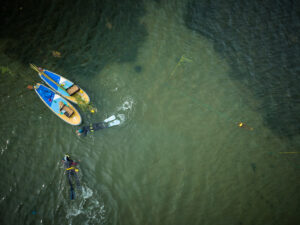Travel for the Future
With the world changing before our eyes, travel must adapt to protect and preserve the beauty of our environment. Here the True Travel team explores what it means to travel for the future.
With our busiest ever summer this year, it would be fair to assume that travel has officially ‘returned’; and although there has been an optimistic ‘no time to be wasted’ attitude resounding with many, there is also an air of underlying caution as people consider the impact (or rather lack thereof) of the tourism hiatus.
The industry is embracing a new way of thinking, and you’ll be hard pressed to find a travel company that isn’t talking about travelling with a purpose, travelling responsibly or promoting conscious travel. It is crucial that we are all engaging with how the industry is evolving; acknowledging the impact it has had and the impact it can have, as just one piece of the puzzle, in driving positive environmental change globally.
There is no success in independence when looking at how we can make positive changes; and as we look forward, in 2023 and beyond, we have to consider the future of travel and the part it plays in the global climate crisis. The genuine desire to explore the world and discover the endless potential of new destinations is unanimous and unwavering. It is evident society is more thrilled than ever to be reconnecting with like-minded people, exploring the wilderness of nature and embracing the vibrancy of new cultures. So in order to secure the future of travel, we have to explore all the ways we can travel for the future. How do we enjoy the freedom of life again, whilst protecting the fragility of it?


What is slow travel?
You may have heard of the slow food movement. It originated in Italy in 1989 and aimed to preserve regional cuisine, local farming and traditional cooking methods through education of tourists and local residents. People were realising that increased tourism was changing the way that people were eating, bringing larger, chain-based restaurants to major cities and taking away profits from family-owned establishments. The slow food movement worked to draw business back to traditional restaurants by touting the benefits of using regionally-sourced ingredients and stimulating local economies.
So in a similar vein, slow travel is an approach to travel that emphasises connection: to local people, cultures, food and music. It relies on the idea that a trip is meant to educate and have an emotional impact, in the present moment and for the future, while remaining sustainable for local communities and the environment. Going slow is synonymous with sustainability because it is not only less carbon-intensive, but it facilitates a deeper understanding of places we travel to. By turning away from the journeys carved up by convenience, speed and ease, we’re more likely to avoid overtourism, explore the lesser-known, and foster a more genuine connection with people and place.
Instead of fretting about lost luggage and losing half a day to another inevitable delay from the airline, think about boarding that train or boat; the scenic route has so much to offer after all (and you will probably still arrive at the same time!). Rather than tolerate the disturbance of a diesel vehicle during a game drive, explore the remote wilderness on horseback or foot. Replace a dashing stop at a crowded cafe in the city centre, for a long homemade lunch with a local family in their rural farmhouse. Your senses will be illuminated when you choose the path less travelled, a route more humble in nature, as you take the time to enjoy the journey, not just the destination.
However, going slow is no longer just about how we get around, it’s also a mindset. For luxury travel, this means avoiding resort hopping and recognising the benefits of staying in one place for longer. Have you ever left a trip feeling more tired than when you arrived? Trying to see or experience as many things as possible within a short period of time can be exhausting. So ditch your typical frenetic mentality and slip into the pace of the local culture. Instead of thinking of your trip as a list or as a checklist, reframe it as an opportunity for growth, education and development. That to-do list that you created doesn’t need to be fully completed in order for your travels to have been successful. You can always head back to that destination later to see what you missed! When you slow down, you have space and time to develop connections with a landscape or culture on a more meaningful level. Often, slowing down also provides the break from normality we need to reset and head into the world anew.
With a more tempered approach to travel, we implore you to unwind and indulge in the luxury of life in the slow lane.


Can I really offset my carbon?
Let’s start with the basics. The idea behind carbon offsetting is that the carbon emissions generated through an activity (like flying) can be calculated, and then the equivalent amount “paid off ” via a scheme which removes carbon from the atmosphere (such as tree planting). To work, the “carbon removal” scheme or project must be in addition to existing schemes and must permanently lock away the emissions. So yes, it is possible, but it is not as simple as paying a few extra dollars or pounds on your trip to a company who are saying they will plant you a tree.
One of the most efficient means of offsetting your carbon is supporting a blue carbon project. When protected or restored, blue carbon ecosystems (mangroves, tidal marshes and seagrasses) sequester and store carbon. However, when degraded or destroyed, these same ecosystems emit the carbon they have stored for centuries into the atmosphere and oceans and become sources of greenhouse gases. As an example, seagrasses cover less than 0.2% of ocean floor, but store about 10% of the carbon buried in the oceans each year.
Seagrasses are being lost at a rate of 1.5% per year and have lost approximately 30% of historical global coverage. Therefore, funding a partner like Seawilding to continue their restoration work, does allow you to genuinely offset your carbon.


What is regenerative tourism?
Sustainability is about making sure that the resources we enjoy today will still be available for the generations that follow; regeneration is about making sure that what we do now feeds back into the system from which we benefit. It’s about being proactive and intentional. Its main goal in the context of tourism is for visitors to have a net positive impact on their holiday destination, meaning that they leave it in a better condition than how they found it as simply sustaining our current system will not be enough to address the scale of all that could be lost if we fail to act quickly. Tourism is capable of doing so much more than just providing economic benefits to a destination, and in fact measuring the other ways it positively contributes to a place will be essential in building a more resilient and diversified industry. Regenerative tourism asks us to take a step back and see the bigger picture, and the ways in which the health of communities, nature, business, and visitors intertwine.
The Business of Conscious Travel
The travel industry is awash with sustainable, regenerative, transformative, positive impact, responsible and purpose-driven themes. So much so that it can dilute the message and making an educated decision about where to spend your hard-earned cash has never seemed more complicated. Determining what’s responsible is nuanced. It relies on context, local knowledge, and sometimes years of experience. Finding a tour operator or travel designer that you trust to do this for you is imperative.
Here are 5 traits to look for in a responsible operator:
1. They are proud to be specialists
Understanding local infrastructure, recognising environmental and social challenges, and identifying suppliers and hosts that care for their employees and destination as much as their guests can require years of experience. Curating a travel itinerary that does good can’t happen overnight. Therefore, the most responsible operators tend to specialise and be honest if a region or destination isn’t somewhere they have existing relationships.
2. They prioritise locally owned businesses
Whether it’s accommodation, experiences or local guides, your tour operator should be working hard behind the scenes to ensure the money you are spending goes back into the community, rather than being funnelled out to international companies. This local approach is not only the best way for tourism to become more sustainable and equitable but leads to infinitely better experiences.
3. They champion positive impact
Responsible travel is no longer solely about reducing adverse impact. It’s about supporting and championing solutions to environmental problems while advocating for change. Your tour operator should embrace the challenge with integrity, action and ambition. Initiatives will include reducing carbon emissions at an operational (in the office) and trip level, avoiding over visited areas of natural importance, and respecting the environmental and social conditions specific to each destination.
4. They offer perspective
It can be surprisingly easy to think only of your needs and wants when planning a trip. Whilst a good operator should always listen to your wishes, an excellent operator should also be able to challenge you and offer a different perspective and approach. There is very little in the world that money can’t buy, but just because you can, doesn’t always mean you should.
5. They seek out challenges
Finally, any business sincere about doing good knows that sustainability is a continuous journey of improvement. The commitment and change happening in the travel industry right now is just the tip of the iceberg and they need to proactively search for ways to challenge the status quo.
Related Posts













